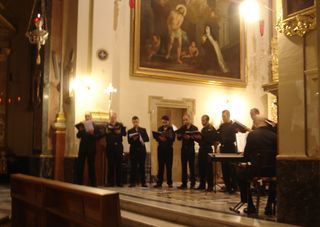Difference between revisions of "Cappella Sanctae Catharinae"
| Line 14: | Line 14: | ||
*[http://www.facebook.com/pages/Cappella-Sanctae-Catharinae/177726765667002 Facebook page]] | *[http://www.facebook.com/pages/Cappella-Sanctae-Catharinae/177726765667002 Facebook page]] | ||
[[Category:A-Z of the Malta Music Scene]] | |||
[[Category:choirs]] | [[Category:choirs]] | ||
Revision as of 10:30, 17 November 2012
Cappella Sanctae Catharinae are Malta’s only male choir. It concentrates mostly on Italian Renaissance and Early Baroque polyphony, especially the works of Giovanni Pierluigi da Palestrina, Victoria, and Viadana. Cappella Sanctae Catharinae was formed in 2009 as a chamber choir specialising in Renaissance polyphony. The choir started off as a performance project tied to the concert series held regularly at the Church of St Catherine of Italy in Valletta. Following positive critical acclaim, the original members decided to make the choir a permanent group. Although the choir has only been a year in existence, it has already established itself in the Maltese cultural scene with a number of concerts to its credit.
The Cappella Sanctae Catharinae has performed in various venues across Malta including the Carmelite Church in Mdina, St Paul’s Anglican cathedral, and the parish church of St. Catherine in Żejtun. It is also the choir’s policy to utilise as much as possible the multitude of churches around Malta not only to reach out more into the community, but also to give a sense of the effect of the music’s original setting.
In 16 November 2012 the choir presented a programme entitled O Quam Suavis, that included Italian polyphony from the 16th and 17 centuries, at the church of Santa Tereża in Bormla. The choir was composed of two cantus, three tenors, four baritones and three basses. Their organist is Alex Vella Gregory, who is also a baritone. Amongst the polyphonies that they sang were Ave Regina Caelorum by Suor Isabella Leonarda (1620-1704), Salve Regina by Claudio Monteverdi (1567-1643)and Alma Redemptoris by Palestrina (1526-1594).
